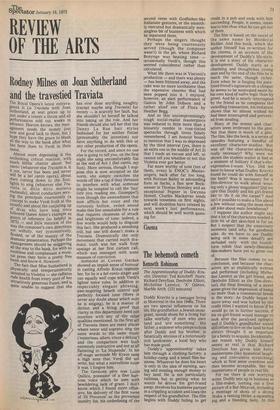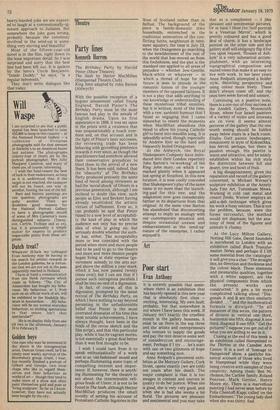Cinema
The behemoth cometh
Kenneth Robinson
The Apprenticeship of Duddy Kravitz. Director: Ted Kotcheff. Stars; Richard Dreyfuss, Denholm Elliott, Micheline Lanetot. 'X' Odeon, Marble Arch. (121 minutes)
Duddy Kravitz is a teenager living . in Montreal in the late 1940s. There are two special influences on his life. His grandfather, a Jewish immigrant, mends shoes for a living but talks wistfully of men who own land and 'are something'. His father, a widower who pimps to look after Duddy and his brother, is fanatically envious of a notoriously rich landowner, a local boy who has made good.
Duddy's 'apprenticeship' takes him through a clothing-factory, a holiday-camp and a small film-business. Whatever he does his heart is only in the idea of earning, saving and stealing enough money to buy land. He is not particularly ruthless, but in getting what he wants he drives his girl-friend away, involves his business partner in a crippling accident and loses the respect of his grandfather. The film begins with Duddy failing to get credit in a pub and ends with him succeeding. People, it seems, mean less to him than what he can get out of them.
The film is based on the novel of the same name by Mordecai Ftichler. And this book, which the author himself has re-written for the cinema, is an account of the development of Duddy's life-style. It is not a story of his character development. Duddy starts as a charming and thoughtless young man and by the end of the film he is much the same, though richer. Even when he is forging his paralysed friend's signature on a cheque he seems to be motivated more by his own kind of naive logic than by greed. And he is nearly interrupted by the friend as he completes the. swindling transaction, his irritation shows that he almost wished he had been interrupted and prevented from stealing.
Many of the scenes and characters seem irrelevant to the plot. Not that there is much of a plot. The film, like the book, is a series of episodes featuring a handful of excellent character-studies. But was all the character-sketching really necessary? Why were we shown the student-waiter in bed at a moment of Solitary if-that's-theexpression-I-want Vice. Did we have to know what Dudley Kravitz found he could do with himself in the bath? Was it necessary for a film-director to walk about wearing only a glossy magazine? Did we care that Duddy and his girl-friend like to 'do it on the carpet'? And isn't it possible to make a film about a Jew without using the most tired old joke about male Jewishness?
I suppose the author might say that a lot of the characters needed a little bit of dirt sketched in for us. But I suspect that the unsavoury moments (and why, for goodness sake, do we have to see Duddy being sick in some detail?) are included only with the fourthform relish that newly-liberated film-makers have yet to grow out of.
Because the film comes to no conclusion, and because the characters are so realistically written and performed (including Micheline Lanetot as the girl friend, and Denholm Elliott as the film-director), the final freezing of a street scene gives the impression of being no more than a commercial break in the story. As Duddy began to move away and was halted by the credit titles I wanted to know if he would go on to further success, if his ex-girl-friend would manage to look after the paralysed epileptic and if Duddy's grandfather would still refuse to live on the land he had always thought it so important for a family to acquire. Incidentally, one reason why Duddy himself seems so real is that Richard Dreyfuss has given him hefty mannerisms (like hysterical laughing and convulsive scratching) which at first seem overdone and then become acceptable, like the mannerisms of people in real life.
For me there is one worrying scene. Duddy sets up in business as a film-maker, turning out a first picture of a Bar-Mitzvah, including a montage of shots of a diving Stuka, a ranting Hitler, a squealing pig and a bleeding baby. In this heavy-handed joke we are expected to laugh at a conventionally-ignorant approach to Judaism. But somewhere the joke goes wrong, probably because the ceremony involved in the send-up is something very moving and beautiful Most of the fifteen-year-old novel is in the film, right down to the least important detail. So I was surprised and sorry that the best line had been left out. It is spoken by the hero's Uncle Benjamin. "Inside Duddy," he says, "is a regular behemoth." They don't write dialogue like that today.



































 Previous page
Previous page